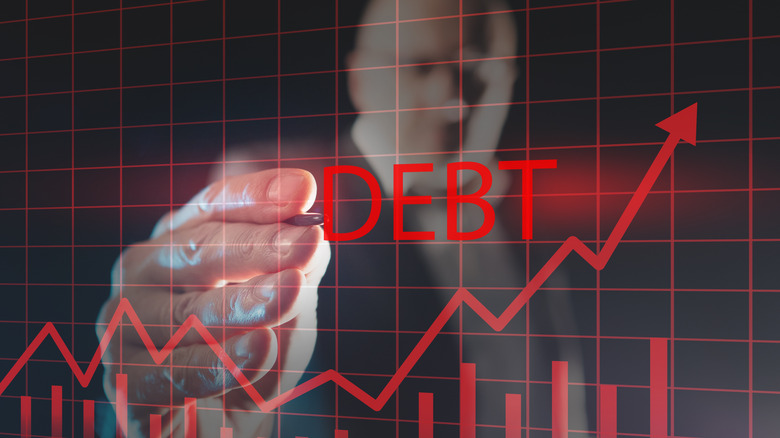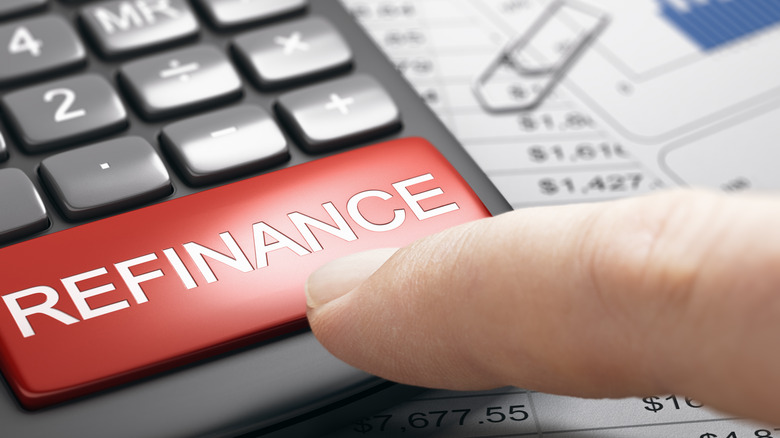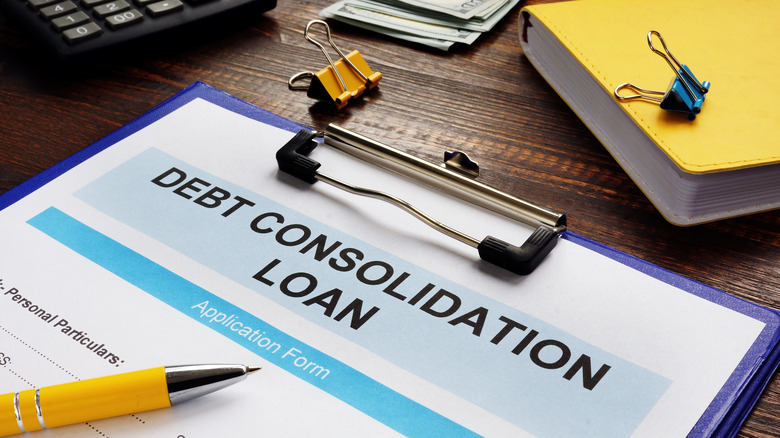What You Need To Know Before You Get A Debt Consolidation Loan
A debt consolidation loan can be a beneficial financial product for someone with multiple debt accounts that have begun to stack up and exert sizable downward pressure on financial goals. A debt consolidation loan is a way to bring a number of individual debts under the umbrella of a single lending product. Debt consolidation works in the same way that any other type of personal loan might operate, but it comes along with a unique benefit that can be hard to quantify in all its facets.
For one thing, debt consolidation loans make an immediate impact on your financial calculations by condensing a number of minimum payments into a single repayment stream. Instead of having to worry about a calendar full of repayment deadlines, a debt consolidation loan creates a single debt burden that you can manage in one place with greater ease and clarity. However, lending products are not free, and the typical debt consolidation option will come along with origination fees, ongoing interest charges, and the potential for other additions that may or may not work for your existing financial circumstances. Weighing the benefits up against the potential hazards that come along with any lending opportunity is a must.
Debt consolidation does exactly what it advertises
A debt consolidation loan does exactly what it purports to do. Instead of paying a number of different creditors, you'll bring all of your debts (or a sizable number of them) under the aegis of a single lender. Functionally this means that you'll borrow money from a debt consolidation lender in order to pay back existing debts elsewhere. This transfers your debt from one lender to another and frees you from the need to maintain a long-running calendar of repayment dates and financial obligations.
The option to consolidate debt is something that many Americans take advantage of each year. Debt consolidation loans are often widely available from a number of different lenders who make it easy to utilize this opportunity. Debt consolidation loans are available with options extending to both borrowers with great credit and weaker credit histories alike. Of course, looking into the specific criteria of your lender is an important step in the process. These loans can be used to effectively manage credit card spending, medical bills, and many other accrued debts that you may be carrying.
A debt consolidation lender may charge you an origination fee
One thing to keep in mind about any borrowing opportunity is that it comes along with its own variety of costs. Typical loan products will incorporate an origination fee that must be paid either directly to the lender or as an addition to the principal balance to be paid back over time. An origination fee is often a percentage of the total amount borrowed rather than a flat fee. When calculating the viability of any loan product for your specific needs, it's essential to factor in any additional costs that come along with the loan. This means weighing the benefits of a debt consolidation loan against the origination fee and any other factors that may raise the price of borrowing.
It's worth remembering that loan products are essentially the purchase of money in the short term. When you take out a loan you are buying capital in the immediate future with the cost of that cash coming due over the long term. The more you have to pay your lender back as a result of time-based interest or the addition of origination and other fees, the more costly that borrowing product becomes. Keeping these features in mind is critical to making an intelligent decision when it comes to any loan.
Keep an eye on interest rates to find favorable terms
Often, a debt consolidation loan will cost less than the ongoing cost of a credit card bill. This comes in the form of lower interest rates. Personal loans typically charge lower rates then credit card accounts. For instance, Business Insider reports that the average credit card interest rate is 18.43%, while Experian states that a personal loan rate runs roughly 10% for a two-year repayment term. Swapping a higher interest rate for a lower charge on your principal balance is a highly effective means of reducing the overall cost of your debt.
Interest rates are shifting, however, so hunting around for favorable terms should always be a priority for anyone managing ongoing debts. In an uncertain market, the power of time is likely a greater driving force than your credit score or competitive quotes from a number of lenders in your area. Waiting for rates to hit a favorable number can seem exhausting, but getting a great bargain on your repayment terms is a feature that will pay dividends for as long as you participate in the consumer marketplace itself. As well, waiting for more favorable terms gives you time to continue focusing on repayments that are likely to work in your favor when it comes to raising your credit score, improving your odds of qualifying for a loan, and utilizing favorable rates in the future.
Debt consolidation loans are not structured like credit card bills
A debt consolidation loan is a personal loan product and not a revolving line of credit. This means that loan repayments will be structured according to terms tied to duration rather than a percentage-based management strategy. Experian reports that typical durations range from 12 to 60 months (or one to five years). Instead of minimum payments, you'll have a set contribution requirement. By paying this amount every month, you'll work toward the elimination of the debt rather than the simple management of money owed. This can be a powerful force in the life of a consumer with less-than-stellar borrowing habits. What this change in repayment does for someone used to paying down a credit card bill each month is adding a clock that will continue to tick down; this signals an end date rather than a deadline when it comes to payments and can be immensely motivational.
A personal loan, or debt consolidation loan in this instance, will be structured with the number of months as the primary feature. You may borrow funding for 12 months, 24 months, 36 months, or perhaps even longer. This is highly beneficial because it gives you an end date for the debt and simply maintaining your required payments will settle the balance. Conversely, a strategy of only paying minimum payments to your credit card lender can balloon your debt by an astronomical figure and see you repaying the loan capital for decades.
Loans can be secured or unsecured
A debt consolidation loan can be offered as a secured lending product or an unsecured one. This arrangement can be seen in other lending products, as well. The difference can be stark, but the layout of either type is easy to follow. A secured loan is one that is backed by an asset you own. You might offer your home, car, or something else of value that you possess as collateral for the borrowed capital. In return, a lender is likely to offer a reduced rate for the principal balance. This is because if you default, the lender can seize the collateralized asset and sell it to recoup its costs.
Alternatively, an unsecured loan is one made without any securitizing asset. Unsecured loans are common in the world of finance, but because of the added uncertainty that comes without collateral backing being added to the mix, rates are typically higher because borrowers may be more likely to default. Without collateral, a borrower's word is their bond. When the borrower's home is on the line there is a real and immediate consequence to defaulting that goes above and beyond any impact on a credit score. If you consistently pay your debts on time and have enough savings to ensure that default is unlikely, then making use of a secured loan might be a great benefit to your long-term financial planning. However, the consequences are dire and this decision should not be taken lightly.
Early repayment may not be possible
In many personal loan terms, there may be stipulations about early repayment. With a debt consolidation loan you might be less likely to take advantage of early repayment opportunities than with other loans or lines of credit. Paying off debt early helps save you money on the interest tacked on to the principal. However, lenders are often hesitant to provide this additional leverage when using funds as a debt consolidation measure. This isn't to say that you'll never find a debt consolidation loan that allows for early repayment, but rather that it may be less common than in other instances.
If you are locked into repayment terms over an agreed-upon duration and can't pay the loan back early then you will be making a commitment to pay the total sum calculated based on ongoing interest additions and the principal balance (including any origination fees or other costs associated with the loan). It's important to understand whether you can pay back your debt early or not before agreeing to terms. Even a small overpayment each month can go a long way because it strikes directly at the principal balance rather than tackling interest additions. Clarifying this point is critical to managing your long-term finances successfully while using a debt consolidation loan. Forbes Advisor suggests speaking directly with your lending professional about this point in order to gain crystal clarity here.
Penalties for late payments could be stiffer
Alongside the potential for early repayment, or penalties for this action, it's important to understand what you'll be charged if you make a late payment or miss a payment. With a debt consolidation loan, penalties across the board may be stiffer than those associated with your credit card account.
Of course, no one wants to miss a payment or make a late payment and potentially feel an impact on their credit as a result. However, many people who rely on debt consolidation loans may already be overwhelmed with their required contributions, or they may be nearing this stage. This circumstance can make for a monthly calculation of what can be afforded on a revolving basis. There may come a time when a borrower has to make a tough decision between paying their credit card bill on time or purchasing groceries to put food on the table for the next week. Evaluating the penalties for late or missed payments will help you place this new debt obligation in a pecking order alongside other bills, credit card obligations that you aren't paying off with the debt consolidation loan, and any other expenditures that factor into your fiscal life.
Fortunately, while a credit card account may be subject to penalty APR adjustments that make the repayment even more difficult after you've missed payment or contributed late, personal loans typically don't incorporate this type of repercussion — but will certainly charge late fees.
Debt consolidation could be immensely beneficial to your credit
The use of a debt consolidation loan can act as a new lease on your financial life. The ability to condense repayments into a single outgoing expense while placing an end date on this expenditure is certainly transformative for many people who take advantage of debt consolidation loans.
It's also worth noting that varying mix of credit and lending products can actually improve your credit score over the long term. If you don't already have a personal loan of some sort in your name, a debt consolidation loan can add this kind of borrowing product to your financial resume. With regular repayments and responsible financial management of this new debt, you may even see a significant jump in your credit score in the future. This is because you'll add a new type of fiscal responsibility to your credit history and eliminate or severely reduce the volume of debt on existing credit accounts at the same time. This means that many or all of your existing creditors will report a sharp payoff of loan balances and a new lender will begin reporting consistent payments and the reduction of your total debt burden as time continues to march on.
The benefit here can't be overstated, and with responsible financial management, you can leverage a debt consolidation loan to your advantage in many more ways than one.
Debt consolidation isn't for everyone, but might be right for you
However, it should be noted that debt consolidation loans aren't for everyone. The debt consolidation loan will add to your total amount owed. This comes through the origination fee and any other costs associated with the loan, as well as the interest added to your balance over the duration of your repayment period.
For many, this trade-off is certainly worth it. Yet for some, this changeover doesn't actually help much. For instance, an employee who experiences seasonal or yearly bonuses may calculate the amount a debt consolidation loan will cost to use and find that leveraging their bonus to pay off an existing credit card bill where it stands might be more cost-effective. Workers who see fluctuations in their regular salary payments might also have trouble in keeping up with this new mandatory expenditure instead of repaying their debts in the traditional manner.
Still, debt consolidation loans offer a path forward that many can take advantage of. However, it's important to know that these financial products operate best when you also commit to reducing or eliminating new spending on credit accounts. There is a paradigm shift that must occur when leveraging any kind of lending product that will help you get out of that faster. Utilizing strategies that will maximize your success alongside a debt consolidation loan is the only way forward, and some won't be able to commit to both of these in tandem.









